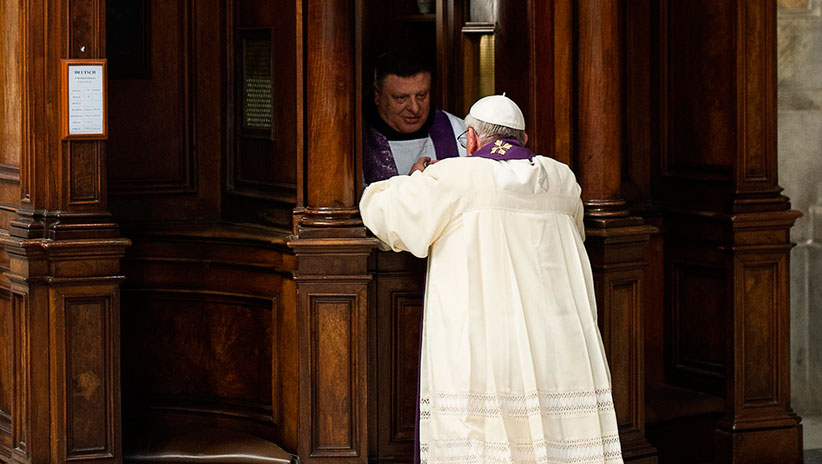Going to confession can be intimidating. The sacramental process of entering a confessional; of disclosing our sinful thoughts, words, and actions; as well as disclosing the good deeds that we failed to do, can potentially provoke anxiety and fear in some people. Perhaps this is why some of us do not go to the sacrament of reconciliation today. Fear can certainly be powerful and influential. However, comprehension of and faith in the significance and value of this sacrament have apparently proven to be more compelling and overpowering in the lives of those that go to individual confession regularly. These Catholics cherish the liberating and healing experience of living the sacrament of reconciliation, as they are forgiven of their past sins and made whole again as children of God in the image of Christ. They also enjoy the inner strength and peace they obtain as their relationship with Christ is restored and they are empowered once again by His Spirit. For these Catholics, individual, one-to-one private confession is a profound experience of immense grace and renewal.

Individual Confession Has Been Declining
Individual confession was a frequent practice up until the early 1960s. Unfortunately, it seems that it is not today. Many have wondered why individual confession has gone down over the years. Some have erroneously stated that the new communal rite of reconciliation with general absolution has made individual confession obsolete for them. Others say its reduction is due to a loss of an awareness of sin. And some others have suggested that certain personal moral issues, such as the use of birth control, have resulted in fewer people seeing the need to go to confession.
Certainly, Catholics on birth control may have decided to stop going to confession because the Church views its use as sinful and they are unwilling to stop using them. However, many are unclear as to why using artificial contraception is immoral. This highlights part of an underlying cause for the decrease in confession. A significant number of contemporary theologians have disagreed over the years with the ecclesiastical hierarchy’s decision to call the use of the contraceptive pill and other forms of artificial birth control a sin. Consequently, this dissent and other disagreements have negatively contributed to the confusion and misunderstanding among many Catholics about what is sinful and what is not.
Poor Preaching and Availability
Is there a single reason why individual confession has declined dramatically? I do not think so. But the reasons mentioned above have certainly added to this issue. However, there are some other reasons that merit significant attention. St. Paul said to Timothy: “Proclaim the word; be persistent whether it is convenient or inconvenient; convince, reprimand, encourage through all patience and teaching.” (2 Tim 4) Today, too few preachers are responding adequately to this call. Not enough ordained and lay preachers are preaching firmly about sin, the real existence of the devil, the need to repent and to live a life of prayer. Much less have been courageous enough to preach on personal moral issues by proclaiming what sacred Scripture, sacred Tradition, and the Church’s Magisterium have to say about them. Sadly, few are preaching prophetically so the truths of the Faith are proclaimed unequivocally at all times. Therefore, the faithful are not gaining a clearer understanding of why the Church believes what it believes, does what it does, and on what it means to be a true follower of Christ and of God’s commandments. True prophetic preaching serves to convince the faithful in the Faith, mercifully reprimands personal and not just social sin, and encourages them to live a holy and virtuous life. Eventually, this leads the faithful to repent, confess, and amend their lives, while acknowledging this sacrament’s value…
Indeed, the frequency of individual confession has tapered off over the years. But what is equally unfortunate is that too many priests are making themselves less available to administer the sacrament compared to fifty years ago. Many of these ordained ministers are offering fewer confession hours because they observe that fewer people have been going to confess their sins. However, this is ultimately a disservice to God’s people and to the growth of the Church. In the secular world, astute business owners would not drastically reduce their store hours because they notice fewer clients today than yesterday; they would find a way of regaining their clients. If these priests are finding other things to do when they could be administering the sacrament of reconciliation, then their unavailability reduces the availability of the sacrament and this, in turn, results in a smaller number of people going to confession. For sure, this greatly affects the number of individual confessions in the long run. Interestingly enough, the parishes I visit that make confession available for more hours, or before every Mass, have more penitents in line. Hence, I believe that if priests make themselves more available, and consistently state in their homilies why the sacrament of reconciliation and conversion are necessary, this will lead to more confessions, conversions, and souls being saved.
Encouraging An Increase in Individual Confession
Nevertheless, the task of encouraging the faithful to confess more frequently does not fall solely on one group of ministers. As catechists, lay and ordained preachers, spiritual directors, and pastoral ministers, we must all share the responsibility of promoting and encouraging individual confession. We are tasked to communicate the value of this sacrament in word and deed, and to teach the reality of sin and the need for reconciliation with God’s compassion and for our neighbor’s salvation. God’s love calls us to repent and believe in the Gospel, and to communicate the Gospel’s whole message.
Truly, confession is a religious experience that can be shaped by a number of different factors, especially “the main players:” God, the penitent (the person going to confession), and the priest. Concerning God, He never changes. God is a just and merciful God. He is present at the sacrament to judge whether we are truly sorry, but especially present to forgive, heal, and renew. However, what can really shape this experience for better or for worse is the penitent and the priest. The spiritual fruits of this sacrament can depend on the penitent’s intention in confessing; the examination of conscience he carries out; the repentance he possesses; the faith and hope he takes into the confessional; and the desire to change.
On a lesser note, the appreciation for this sacramental experience grows along with the welcoming spirit of the priest; the attentive listening he offers; the patience and compassion/warmth he practices; the relevance of his counsel; and the encouragement he provides. And while it is true that an occasional Catholic priest administers a cold and intimidating confession, this is very uncommon. Thankfully, God can still bring good out of this if we let Him. And despite these very rare occurrences, the Roman Catholic sacrament of confession is a transformative and healing experience. However, living this experience depends greatly on the penitent cooperating with God’s grace. Catholics that approach the sacrament of reconciliation with immense faith and hope in God’s mercy will certainly live a profound experience of immense grace and renewal.
